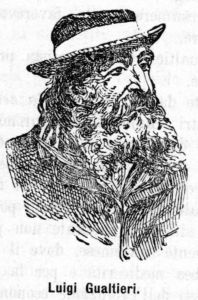Literate Letter
 Luigi Gualtieri was born in Saludecio, in the Rimini area, on 2 April 1827, to Lorenzo, the town doctor, and Isabella Donati.
Luigi Gualtieri was born in Saludecio, in the Rimini area, on 2 April 1827, to Lorenzo, the town doctor, and Isabella Donati.
Enrolled at the University of Bologna, he was forced to interrupt his studies in law due to the death of his father.
So he decided to dedicate himself to literature, as he himself wrote, "for inclination and to provide his family with first aid".
In his early twenties he began to enter the romantic milieu of Milan in the years immediately after '48, in which he seemed to distinguish himself for his eccentricities (he was, moreover, a fan of spiritualism); and in Milan he worked mainly, publishing numerous works in handouts with the publishers Barbini, Bietti, Sanvito, Battezzati.
Also known under the pseudonyms of Count of Brenna or Duke of Athens, prolific narrator and playwright, he mainly composed novels and historical dramas set in the Middle Ages or the Risorgimento, according to the dominant taste of the time.
In the two-year period 1855-56 he was called by the Marquis G.N. Pepoli to write the Bolognese newspaper "L'Incoraggiamento", a weekly publication, structured on a series of chronicles, "dramatic theatrical correspondences", from various cities in Italy, with an occasional correspondence from Paris. It was published in Bologna in 26 issues every Thursday from 8 Nov. 1855 to 3 May 1856. Gualtieri, who could count on a dozen or so collaborators, was there in the role of "extensor" and it was probably his editorial note that appeared in the first issue: the magazine was presented as "an encouragement to all those who are committed to the noble and generous aim of regenerating our theatre, so that the shameful and daily tribute that dramatic France has imposed on Goldoni and Alfieri's fellow citizens may cease".
With the novels published in Milan in 1857, Il capo delle cento tribù", "Storia milanese del tempo dei Galli" and "L'Innominato" - and, above all, following the great success of the latter -, the Gualtieri succeeded in fully entering the literary market, between the fashion of the historical Postmanzonian novel and the incipient Scapigliato rebelliousness.
In the judgment of a contemporary, L'Innominato, "which was read by almost all of Italy, partly because of its title, has truly beautiful pages. When Manzoni read it he encouraged the writer, who was then a young writer, with Manzoni's sincere admiration for youth" (De Gubernatis, p. 536).
In 1860 the Gualtieri, "determined to abandon the uncertain life of the man of letters, in which to live today it is professions to sacrifice art to speculation", wrote to the Minister of Education to ask for a chair of Italian eloquence in a state high school (Arch. centr. dello Stato, ibid.). According to a note on the same letter, Gualtieri, who is also recommended by the Minister of the Interior M. Minghetti, refused the professorship offered to him in Sassari.
The profession of writer continued in the footsteps of the success of the Innominato, the starting point of a real cycle of seven novels, all published in Milan: "Dio e l'uomo" (1861), "I Piombi di Venezia" (new ed. 1864), "Malebranche" (1883), "Pape Satan" (1884), "La città del sole" (1885), "I bevitori di sangue" (1886) and many others.
His marriage to the actress Giacinta Pezzana - from whom he had a daughter, Ada - strengthened Gualtieri's relationship with the theatrical world from 1863 onwards. Between 1863 and 1864, (all with the Milanese publisher Sanvito) "Gulnara la Corsa", "L'abnegazione", "Lo spiantato", "Le fasi del matrimonio" e "La forza della coscienza, ossia Davanti alla corte d'assise" was published, "where for the first time an Assize Circle was on the scene, with witnesses, with the court, with the jurors" (Costetti, p. 287).
As Astraldi wrote, "Gualtieri, in many of his precious works, celebrated the natural beauty of our San Remo, the mild temperament of the inhabitants, the exquisiteness of the manners of our kind guests, who felt they had learned...".
In 1882, he obtained his professional teaching qualification and was appointed Regent of Italian Literature at the Cassini High School in San Remo, obtaining the title in 1886.
In 1883 he ended his troubled relationship with his wife, who became one of the most famous actresses of his time and the protagonist of female emancipationism. After losing almost all her earnings to pay off her husband's debts, an avid billiard player, she decided to abandon him.
Gualtieri died in Sanremo on 1st December 1901.
"As a great lord, he squandered the treasures of the art of writing as a great lord; so that the profuse richness of his work lacked that wise conclusion which alone can ensure fame and fortune" ( G.Costetti).
(Marco Mauro; source Treccani - Astraldi )




